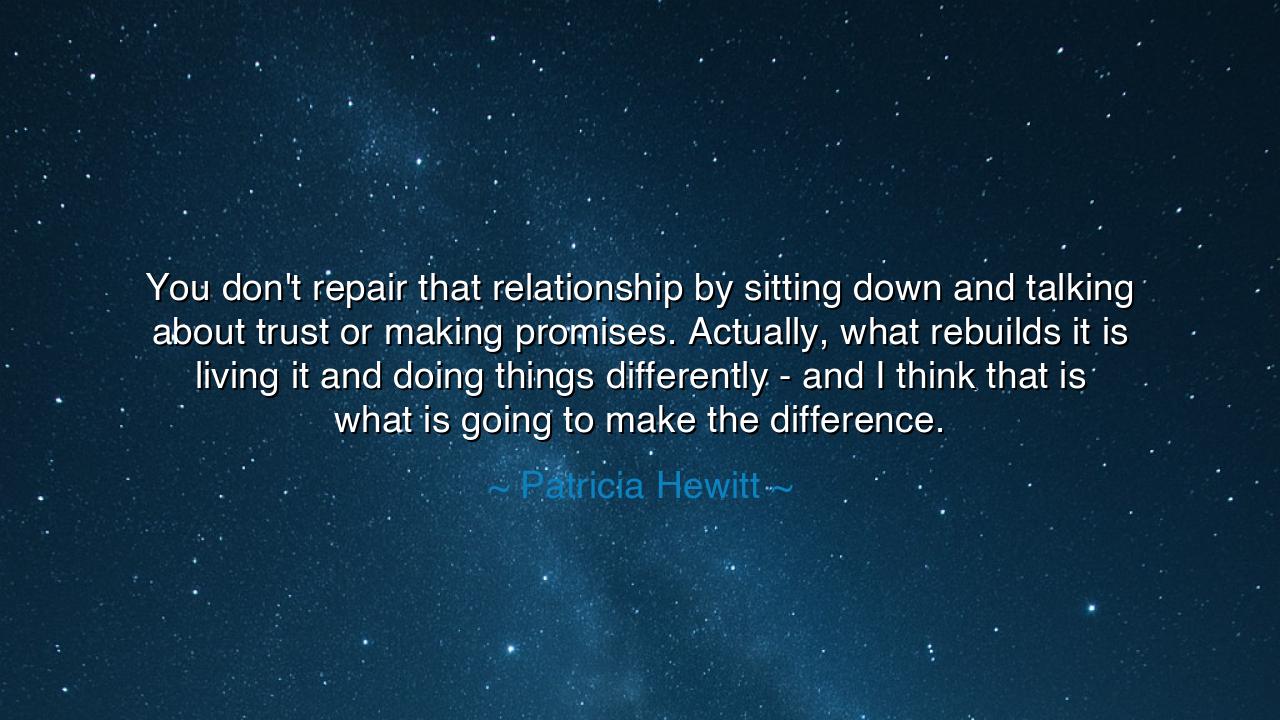
You don't repair that relationship by sitting down and talking
You don't repair that relationship by sitting down and talking about trust or making promises. Actually, what rebuilds it is living it and doing things differently - and I think that is what is going to make the difference.






Hear the wise counsel of Patricia Hewitt, spoken not as empty philosophy but as truth forged in the experience of life: “You don’t repair that relationship by sitting down and talking about trust or making promises. Actually, what rebuilds it is living it and doing things differently – and I think that is what is going to make the difference.” In these words lies the ancient law of reconciliation: that words, though they may soothe the ear, are powerless without deeds to give them strength. For trust is not restored by speech, but by action, by the daily proof of change, by the hard labor of living differently.
The meaning of her words is clear and cutting. When a bond has been broken—between friends, between lovers, between nations—it is not talk that restores it. Promises are but shadows if they are not given flesh in the living of life. To heal what has been wounded, one must walk a new path, show through action that change has taken root, and allow time to prove the sincerity of the heart. Words may begin the journey, but only deeds can bring it to completion. This is the lesson Hewitt offers: that true healing is lived, not spoken.
The origin of such wisdom lies in the realm of politics, where Hewitt herself labored as a public servant. In government, trust between leaders and the people is easily lost when promises are made and broken. Speeches may stir crowds, but if actions betray the words, the people’s faith crumbles. Hewitt knew that only through consistent, tangible change can confidence be rebuilt. Yet her words transcend politics—they are a teaching for every relationship, every family, every human heart.
History itself gives us shining examples. Consider Abraham Lincoln, who inherited a nation torn by war. He did not rebuild trust between North and South with mere speeches, though his words were powerful. Rather, he lived it: he walked among soldiers, visited hospitals, listened to the grieving, and guided policy with mercy and conviction. After his death, it was not only his words but his life, his acts of doing differently, that made him beloved and trusted even by many who once opposed him.
Another tale comes from Japan after the Second World War. The relationship between Japan and the wider world was shattered by devastation. Promises of peace could easily have been dismissed as hollow. But the Japanese people, through decades of rebuilding, humility, and cooperation, lived differently. They transformed their nation from a source of destruction into one of innovation and peace. The trust of the world was not rebuilt in a day, nor by a single treaty, but through the long witness of changed action.
The lesson is timeless: when you have broken faith, do not think to repair it with words alone. Words are easy, but trust is hard. Instead, embrace the discipline of change. Let your daily choices become the proof of your sincerity. Do not boast of what you will do; rather, do it quietly, steadily, until the fruit of your labor cannot be denied. In this way, even the deepest wounds may heal, for action speaks with a voice that words cannot match.
Therefore, let this wisdom be carried into your life: if you would rebuild trust, live it. If you would restore a broken bond, act differently than you did before. Be patient, for trust takes time to grow, like a tree rising slowly from the soil. And remember, it is not great speeches or grand promises that restore relationships, but the steady witness of faithful deeds. In this truth lies the hope of reconciliation, both for individuals and for nations—that by living differently, we may yet walk again in the light of trust.






HHHOANG HANH
I love the practicality of this quote. It reminds me of the phrase ‘actions speak louder than words.’ However, when a relationship is damaged, it’s not just about doing things differently, but also about the emotional work involved. How do you deal with the residual feelings of hurt while trying to live out these changes? Can a shift in behavior really heal deep emotional wounds over time?
CTCuc Thu
I feel like this quote touches on a key aspect of accountability. It's easy to say you’ll change, but actually demonstrating that change requires consistent effort. However, is it possible for some people to fake those actions? How do you really know if someone is genuinely trying to rebuild trust or just trying to appease you? I think that's where things get tricky—how do you discern the difference?
PPPhuong plus
This quote really resonates with me, especially when thinking about relationships that have been broken due to misunderstandings or betrayals. Promises can often feel empty if they aren’t backed up by genuine change. But how do you begin doing things differently when you're not sure where to start? Is it more about consistency over time, or do certain key actions have to happen immediately to show real progress?
HQhung quang
I completely agree with Patricia Hewitt’s point here. Trust isn’t built by just talking about it, but by showing through actions that things are different. In relationships, both personal and professional, how many times have we heard promises that never materialized? It makes me wonder, though, how long does it take for actions to outweigh words? How much patience should one have when trying to rebuild that trust?